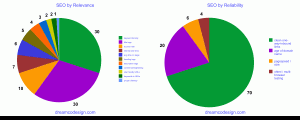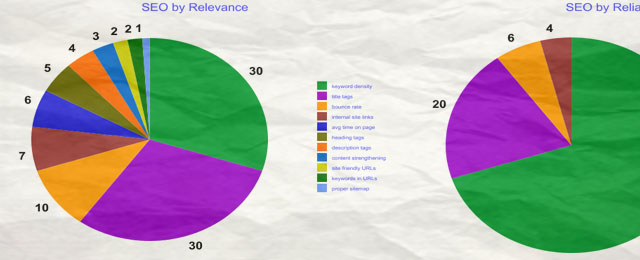This is a re-post of a recent article published on our study:
The analysis was done by manually reviewing the Google Analytics of roughly 50 websites, sampled across various industries while comparing the data to actual search engine ranks in Google for specific keywords that were important to those sites. It should also be noted that the websites themselves were also reviewed individually so that the items considered to be important factors in regards to their search engine placement could be weighed equally.
The study was conducted over 90 days, making up a broad identification of what really matters when it comes to search engine optimization, at least in the eyes of Google.
– Basically Google wants to deliver users to the most relevant and reliable results. There aren’t any cheap tricks or solutions to really get around that. Once you are able to glimpse even a sample of how Google truly “thinks”, its apparent how they have designed their search engine to work for people, organically and naturally, not for web-bots and machines. – Jay Correia (CEO)
While DreamCo Design did not release the full composition of their study, they made it apparent that it all boils down to relevance and reliability while also denouncing ideas involving how social media influences search engine rankings.
The pie-chart which is part of this article breaks down the two major categories of search engine optimization. You can also view the chart on the web design company’s website simply by visitng their blog. They stated that of course this makes up a broad-view of known factors with many other items influencing rank not accounted for here. The major change DreamCo Design was able to identify was how important bounce-rate and time-on-the-page really seem to be in regards to how well one ranks. It appears that Google allows users to really help influence the determination on how “relevant” something really is. If people stay on the site and click around a bit as compared to just leaving, that can make for a very measurable difference in the performance of a keyword.
 They also emphasized that simply having Facebook, Twitter, and other Social Media profiles really offers little to no direct search engine optimization benefit at all. DreamCo Design stated that the benefits are more indirect.
They also emphasized that simply having Facebook, Twitter, and other Social Media profiles really offers little to no direct search engine optimization benefit at all. DreamCo Design stated that the benefits are more indirect.
They explained that if something is buzz-worthy and ends up on a lot of blogs, twitter, and facebook posts, chances are the website will get more traffic, and possibly more links, thus providing an indirect SEO benefit, but nothing direct.
Of course more exposure is always a good thing when it comes to marketing, just not necessarily search engine optimization.

